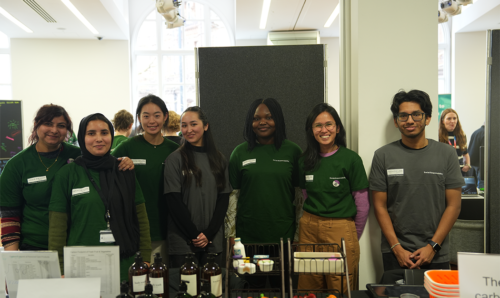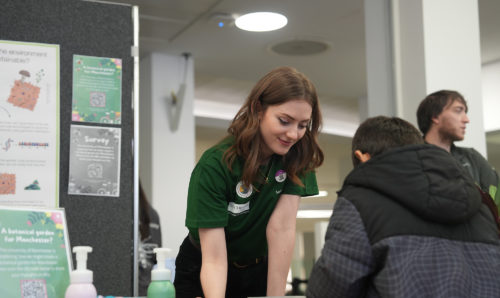World’s #1! FSE helps UoM top sustainable development chart
Social responsibility UOM life 6th May 2021
It’s official. We’re number one. In the world.
The University of Manchester (UoM) has topped the Times Higher Education (THE) Impact Rankings on action taken towards the United Nations (UN) Sustainable Development Goals (SDGs) – and the Faculty of Science and Engineering (FSE) has played a huge part.
Now that’s a lot of acronyms. But, far more importantly, it’s an incredible achievement – and a lot of hard work has gone into it.
The UN’s 17 SDGs represent a global call-to-arms on the most pressing challenges facing humanity and the natural world. FSE has contributed – significantly – to no fewer than seven.
Follow the links to find out more about these wonderful projects.

Tackling groundwater arsenic and health inequalities in India
Delivering on SDG 6: Clean Water and Sanitation, this research – into groundwater arsenic in northern India – centres on where arsenic can be found, how it got there, and the terrible impact it is having on many people’s lives.
Importantly the research, involving Dr David Polya of the Department of Earth and Environmental Sciences, is seeking novel solutions to a problem that causes tens of thousands of premature deaths each year.
Read more about the project aiming for safe provision of that most basic of human needs: water.

Creating a fairer and greener energy supply
Satisfying SDG 7: Affordable and Clean Energy, this project has seen researchers at Manchester working alongside energy supplier Electricity North West, helping it move to renewable fuels, improve sustainability and better manage its networks – all while keeping costs down for families.
The team, which includes Dr Haiyu Li of the Department of Electrical and Electronic Engineering (EEE), has fostered a productive collaboration between EEE and Tyndall Manchester, helping to address key electricity supply areas such as smart distribution networks, power flow fluctuations, and network investment carbon footprints.
Discover more about the project and its tangible impact.

Manchester astronomers help deliver advanced STEM skills training in Africa
UoM has brought a range of innovative STEM training and infrastructure development to support research communities across Africa, helping to address significant skills gaps and delivering on SDG 9: Industry, Innovation and Infrastructure.
Researchers at the Jodrell Bank Centre for Astrophysics, including Dr Robert Beswick and Professor Anna Scaife, have developed training programmes to support self-sustaining research communities throughout Africa – in Ghana, Kenya, Namibia, Botswana, Zambia, and more.
Learn more about these fantastic programmes and both their short and long-term value.

Setting the standard for cleaner skies
Helping to keep skies cleaner – and meeting SDG 12: Responsible Consumption and Production – this research has helped set the standard for the aviation industry today.
Undertaken by Dr Paul Ivor Williams of the Department of Earth and Environmental Sciences, the work has been integral to informing new regulatory standards on emissions of the solid, sooty particles otherwise known as nvPM (non-volatile particulate matter).
Find out more about the research that’s taking off towards better air quality.

Changing how international policy organisations understand and manage environmental problems
Manchester research is aiming to shift the conversation about sustainability policies and climate change away from taxes and regulations, and towards the dynamics and drivers of sustainability transitions in energy, food and mobility systems.
Led by Professor Frank Geels at Alliance Manchester Business School and satisfying SDG 13: Climate Action, the project has led to the development of a new approach combining insights from computer models, socio-technical transition research and on-the-ground demonstration projects.
Read more about the research and its influence towards a low-carbon world.

Removing harmful pollutants from industrial wastewater with innovative technology
In collaboration with Arvia Technology, Manchester researchers have developed an electrochemical process to dramatically reduce wastewater pollution levels, and to enable water recycling across various industries.
The work delivers on SDG 14: Life Below Water and has helped industries reduce their overall water demand, decrease environmental impact, lessen reliance on freshwater supplies, and lower the cost of water bills.
Discover how this project is putting research into practice.

Getting to the root of poor soil health and bringing it back to life
Meeting SDG 15: Life on Land and helping to tackle global issues of degraded soil, this research is helping to establish novel approaches to repairing soil systems and encouraging their healthy regrowth.
The project involves Professor Richard Bardgett of the Department of Earth and Environmental Sciences, and revealed the recovery from degraded to healthy soil can be accelerated by harnessing ecological connections between native soil microorganisms (such as bacteria) and native plants.
Find out how this work is raising awareness of soil biodiversity.
Images: Shutterstock, The University of Manchester
Be sure to subscribe on our homepage to keep up to date with all the latest posts from The Hub.
Chemical EngineeringChemistryclimate changeComputer ScienceEarth and Environmental SciencesElectrical and Electronic EngineeringMaterialsMathematicsMechanical Aerospace and Civil EngineeringPhysics and Astronomy




